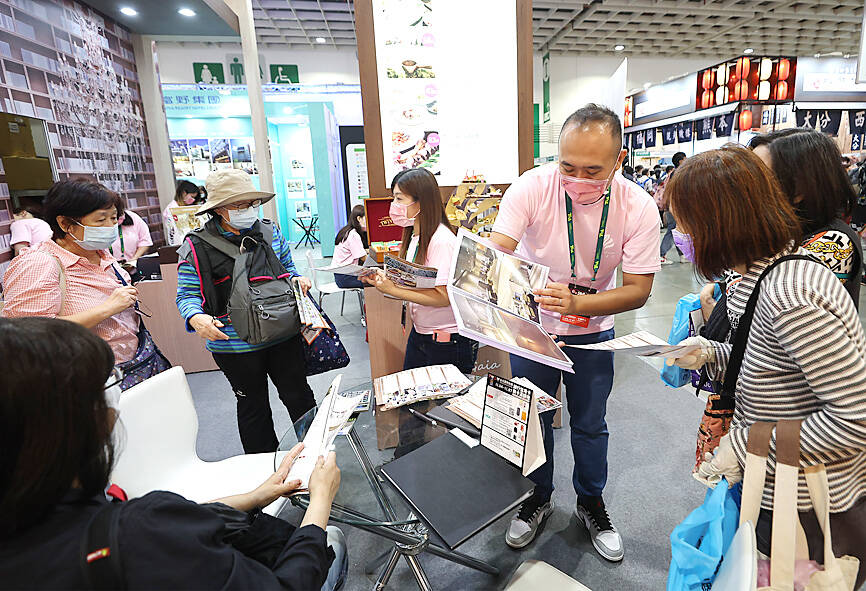The number of workers on furlough programs in Taiwan dropped by 983 over the past week as more businesses brought back staff from unpaid leave, the Ministry of Labor said yesterday.
The number of workers on furlough programs dropped from 18,163 on Thursday last week to 17,180 yesterday, while the number of companies implementing unpaid leave programs fell by 173 to 2,525, ministry data showed.
Department of Labor Standards and Equal Employment Director Huang Wei-chen (黃維琛) said that some companies in sectors driven by local demand have begun bringing back staff from unpaid leave.

Photo: CNA
Citing the support services industry as an example, Huang said that a large travel agency had its last 52 furloughed employees return to work, while the number of furloughed people in the accommodation and catering sector also fell.
In the transportation industry, two airlines that mainly provide flight services to Southeast Asia ended furlough programs following a rebound in passenger volumes, he said.
Although the number of airline ground staff on unpaid leave did not decrease over the past week, Huang said he expects the situation to improve early next year.
Fewer companies in the manufacturing sector implemented unpaid leave programs over the past week, although the number of workers on furlough increased slightly, the ministry said.
The increase was particularly evident in the machine tool industry, Huang said, without elaborating.
According to the latest figures, the number of furloughed workers in the manufacturing industry was 5,422, while the number of companies with unpaid leave programs was 273.
The figures represent a slight deterioration from Thursday last week, when 5,386 people in the manufacturing sector were on unpaid leave and the number of companies implementing such programs was 276.
The weekly furlough data came after government data last week showed that Taiwan’s factory activity shrank for a fifth straight month last month due to inventory corrections and sluggish demand.
The manufacturing purchasing managers’ index last month shed 1.5 points to 43.9, well below the 50-point mark separating growth from contraction and the lowest since the launch of the survey in July 2012, the Chung-Hua Institution for Economic Research (CIER, 中華經濟研究院) said.
The weak manufacturing activity gauge could persist until the impact of global monetary tightening fades, likely by the end of next year, CIER economists said.
Additional reporting by Crystal Hsu

NEW IDENTITY: Known for its software, India has expanded into hardware, with its semiconductor industry growing from US$38bn in 2023 to US$45bn to US$50bn India on Saturday inaugurated its first semiconductor assembly and test facility, a milestone in the government’s push to reduce dependence on foreign chipmakers and stake a claim in a sector dominated by China. Indian Prime Minister Narendra Modi opened US firm Micron Technology Inc’s semiconductor assembly, test and packaging unit in his home state of Gujarat, hailing the “dawn of a new era” for India’s technology ambitions. “When young Indians look back in the future, they will see this decade as the turning point in our tech future,” Modi told the event, which was broadcast on his YouTube channel. The plant would convert

‘SEISMIC SHIFT’: The researcher forecast there would be about 1.1 billion mobile shipments this year, down from 1.26 billion the prior year and erasing years of gains The global smartphone market is expected to contract 12.9 percent this year due to the unprecedented memorychip shortage, marking “a crisis like no other,” researcher International Data Corp (IDC) said. The new forecast, a dramatic revision down from earlier estimates, gives the latest accounting of the ongoing memory crunch that is affecting every corner of the electronics industry. The demand for advanced memory to power artificial intelligence (AI) tasks has drained global supply until well into next year and jeopardizes the business model of many smartphone makers. IDC forecast about 1.1 billion mobile shipments this year, down from 1.26 billion the prior

People stand in a Pokemon store in Tokyo on Thursday. One of the world highest-grossing franchises is celebrated its 30th anniversary yesterday.

Zimbabwe’s ban on raw lithium exports is forcing Chinese miners to rethink their strategy, speeding up plans to process the metal locally instead of shipping it to China’s vast rechargeable battery industry. The country is Africa’s largest lithium producer and has one of the world’s largest reserves, according to the US Geological Survey (USGS). Zimbabwe already banned the export of lithium ore in 2022 and last year announced it would halt exports of lithium concentrates from January next year. However, on Wednesday it imposed the ban with immediate effect, leaving unclear what the lithium mining sector would do in the